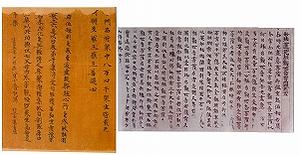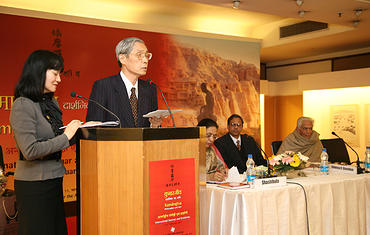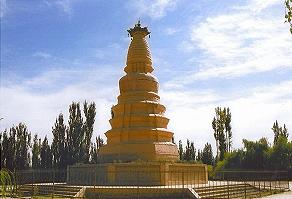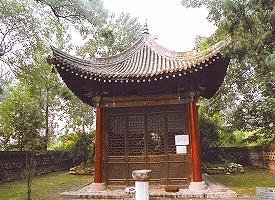

 
|
International
Seminar: “Kumarajiva: Philosopher and Seer”
An International Seminar
“Kumarajiva: Philosopher and Seer” was held for 3 days from February 3
to 5, 2011 in New Delhi. Yoichi Kawada, director of the Institute of
Oriental Philosophy (IOP), and Katsuhisa
Yamada, Commissioned Research Fellow of IOP attended the seminar.
The organizer, the Indira Gandhi National Centre for the Arts, states
the aim of the seminar as follows. “Buddhist savants who traveled from
India to China had contributed to the evolution of Sino-Indian relation
in the ancient period. Buddhist monks nourished not only to the spread
of Buddhism but also for the understanding of social and economic
relations of the past. Buddhist monks were the torchbearers of Indian
civilization to Central Asian and China. Unfortunately ancient records
of India are silent about them. But we have the documents preserved in
Chinese language and may be even in Central Asia languages. This
seminar is one such effort to know about the great monk Kumarajiva.”
Kumarajiva (334–413 CE) was a prolific translator of Buddhist texts. He
translated 35 works in 294 volumes, accomplishing this in a mere ten
years. Prominent among these are the Lotus Sutra, the Diamond Sutra,
the Amitaba Sutra, the Vimalakirtinirdesa Sutra, Malamadyamakarika and
the Astasahasrika-prajnaparimita Sutra.
 At
the seminar, IOP director Yoichi Kawada presented his research on
Kumarajiva and Nichiren, describing how Nichiren learned the essential
teachings of Buddhism from the Lotus Sutra and then expressed its
essence as Nam-myoho-renge-kyo, which Nichiren asserted could help
individuals to awaken to their inherent Buddha nature. At
the seminar, IOP director Yoichi Kawada presented his research on
Kumarajiva and Nichiren, describing how Nichiren learned the essential
teachings of Buddhism from the Lotus Sutra and then expressed its
essence as Nam-myoho-renge-kyo, which Nichiren asserted could help
individuals to awaken to their inherent Buddha nature.
Matsuhisa Yamada, professor emeritus of Osaka Kyoiku University and
Commissioned Research Fellow of IOP, visited Kumarajiva’s
birthplace and other places which are related to Kumarajiva’s life, and
observed his lifetime. At the seminar, he delivered a presentation “A
report on the life of Kumarajiva and the towns associated
with his –Kashgar, Tumushuk, Kupa, Loulah, Dunhuang, Liangzchou and
Chang’an.”
 The titles of other main
speeches delivered at the seminar are as follows: The titles of other main
speeches delivered at the seminar are as follows:
“Kumarajiva’s date of
birth,” “Kumarajiva in Dunhuang manuscripts at the British Library: A
Few Examples,” “Kumarajiva in Eighteen-century Tibetan Sources,”
“Rethinking the Debate between Kumarajiva and Buddhabhadra: Themes,
Background and Influences,” “Kumarajiva and his contemporaries,”
“Kumarajiva: His connections with Kashmir and Propagation of Buddhism,”
“Principles and Philosophy of Tantric Buddhism reflected in the Works
of Kumarajiva” “From Kumarajiva to Nichiren-Connected Through
Myoho-Renge-Kyo,” “Kumarajiva and Early Cave-temples of China,”
“Kumarajiva and Abhidharma,” “Kumarajiva’s contribution to Chinese
Literature: focusing on his translation of Vimalakirti-nirdesa-sutra,”
Two Traditions of Sravaka meditation: Kumarajiva’s Zuo chan san meijing
and Buddhaghosa’s Visuddhimagga,” “The added topic-shift Markers in the
Chinese translations of Buddhist scriptures: A Sanskrit-Chinese
Comparative Analysis of the Lotus Sutra”, and others. Abhidharma,” “Kumarajiva’s contribution to Chinese
Literature: focusing on his translation of Vimalakirti-nirdesa-sutra,”
Two Traditions of Sravaka meditation: Kumarajiva’s Zuo chan san meijing
and Buddhaghosa’s Visuddhimagga,” “The added topic-shift Markers in the
Chinese translations of Buddhist scriptures: A Sanskrit-Chinese
Comparative Analysis of the Lotus Sutra”, and others.
In his opening remarks, Prof. Lokesh Chandra, director of International
Academy of Indian Culture, introduced a historical perspective on how
the Buddhist texts translated by Kumarajiva were brought to Japan and
eventually became foundation of the Soka Gakkai’s philosophy and
its activities for the promotion of peace and human dignity.
 
|











